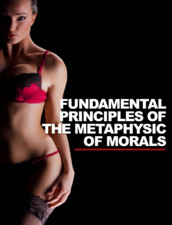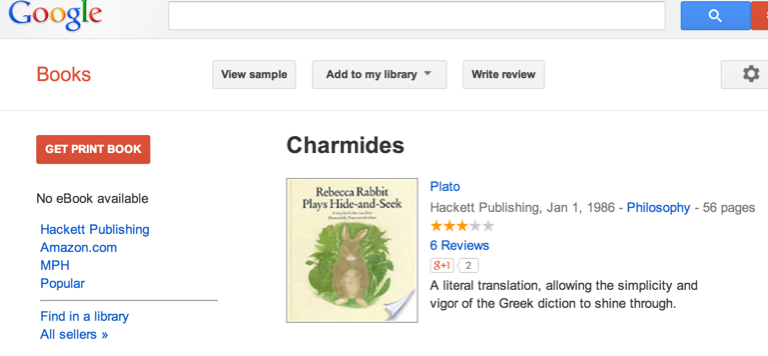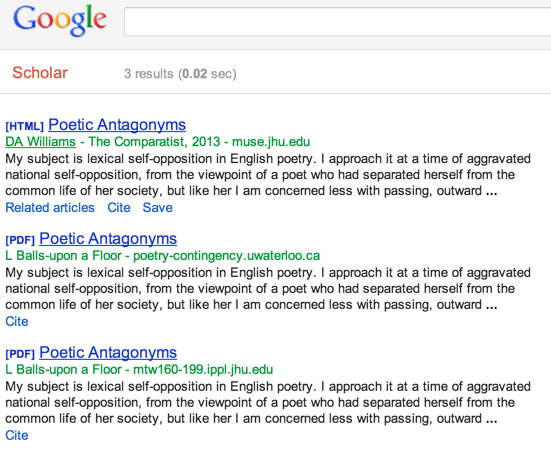New from Plato
« previous post | next post »
Google Books is much improved, but there are still occasional gems:
[via]
From the comments at Crooked Timber, it appears that we may be seeing a new trend in the marketing of philosophy, at least in terms of book cover design — witness this Barnes & Noble digital edition of Kant's Metaphysics of Morals:

Or this iTunes version of the same work:

Unfortunately, multi-modal search technology is not yet good enough to tell us easily whether any classics of linguistics have been marketed with a similar flair. There's this, whose cover picture seems merely random, though perhaps poetically apt for all that:

What else?

D-AW said,
December 31, 2013 @ 7:44 pm
It is much improved, and improves itself daily, it seems. Until a few weeks ago, an article of mine on "Poetic Antagonyms" was attributed to one "L Balls-upon a Floor". Quite a nom de plume. I can't seem to find this attribution any more via regular google searches, but this legacy link still works: http://scholar.google.ca/scholar?cluster=5591907532650993049&hl
[(myl) Lest Prof. Balls-upon a Floor should be lost to the ages, here's a screen shot:


And the helpful multi-format citations:
]
Mark Mandel said,
December 31, 2013 @ 10:09 pm
My only guess is that some reviewer said "charming"…
dw said,
January 1, 2014 @ 2:05 pm
The Barnes and Noble edition of the Kant appears to have been "corrected" to a boring cover (at least on the mobile site). Disappointing.
[(myl) Indeed. I'm glad that I saved the earlier cover art — but I wish I'd made a screenshot of the whole page.]
Rod Johnson said,
January 1, 2014 @ 2:29 pm
"L" stands for "Like" here, I suppose. I wonder why the algorithm picked up that particular line.
Circe said,
January 3, 2014 @ 3:44 pm
Panini Panini? Who's that? The guy's name was just Panini (with the appropriate vowel markers)
Circe said,
January 3, 2014 @ 3:47 pm
It appears from this amazon review (by Chun Tian) that this edition of the Ashadhyayi falls short of the name:
Circe said,
January 3, 2014 @ 3:52 pm
Another thing I am confused about is why anyone would try to sell electronic versions of these classics (even for 99 cents). Anyone wanting to read those electronically would simply go to Gutenberg or the Internet Archive to read them for free.
Michael C. Dunn said,
January 3, 2014 @ 8:28 pm
Now if my philosophy courses had used those editions I might actually remember some Kant. Do you suppose they focused on the word "Morals" rather than "Metaphysics"?
Colin Fine said,
January 4, 2014 @ 6:00 am
Circe : it's a linguistic universal that all personal names consist of a first name and a last name. Except when there is a middle name.
Neil Ren said,
January 4, 2014 @ 6:38 am
To be quite frank the new cover for Kant's classic on Barnes appears to sort of psychological teaser featuring optical illusion. You stare at it for half a minute and the figures start to roll themselves.
Karen said,
January 4, 2014 @ 8:16 pm
@Circe: You overestimate the familiarity of ereader owners with the Internet. Many of them have never heard of Project Gutenberg. Many of them don't, in fact, have computers, just ereaders. (I myself know four such people.)
Also, many of those classics in eformat that sell for $.99 or less are formatted for the reader, which the plaintext at PG are not, really, and some come with notes.
Circe said,
January 5, 2014 @ 7:21 pm
In my experience, many of the Gutenberg books (especially the more popular ones) often have better formatting and hyperlinking than the average ebook. See for example, this (though the Gutenberg version of Kant's book is one of the more austerely formatted ones). On the other hand, the Internet Archive typically has the original PDF files (no scans), though may that more of a minus than a plus on some of the older e-readers.